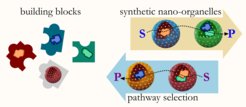Synthetic Silica Nano-Organelles for Regulation of Cascade Reactions in Multi-Compartmentalized Systems
In this study, we have described the construction of synthetic nano-organelles for the regulation of enzymatic reactions in multi-compartmentalized systems. To do that, we have designed silica nano-capsules that can precisely encapsulate different enzymes, allowing the composition of the capsules to be adjusted. The outcome and efficiency of the multistep enzymatic cascade reactions depended on the number and type of nano-organelles present in the system. Moreover, the robustness of silica nano-organelles enabled their encapsulation into giant polymeric vesicles, resulting in multi-compartment bioreactors that mimic the structure of natural cells.
In eukaryotic cells, several enzymatic reactions occur simultaneously every second with unprecedented precision and efficiency. Cells accomplish this impressive feat by organizing the enzymatic reactions into compartments called organelles. These compartments create optimized chemical environments within cells that enhance, protect, and localize various cellular processes such as the hydrolysis of proteins in the acidic interior of lysosomes and gene expression in the nucleus.
The chemistry-in-compartments observed in cells provides a blueprint for the development of synthetic chemical systems that mimic the structure and functions of cells. For example, encapsulation of enzymes in synthetic compartments, such as liposomes and polymersomes, results in simple synthetic organelles that can perform specific biochemical tasks. Although polymers and lipids are typical building blocks for synthetic compartments, virtually any material that forms a robust and semi-permeable shell can become compartments.

In our work, published in the journal Angewandte Chemie, we show that porous silica nanocapsules are excellent synthetic compartments that enable precise and efficient encapsulation of enzymes. The compartments were prepared using an inverse miniemulsion polymerization method that enabled the encapsulation of various enzymes without loss of activity. We achieved encapsulation efficiencies of over 95%, which allowed precise control of enzyme composition. The encapsulation of multiple enzymes in silica nanocapsules enabled the construction of synthetic nano-organelles with chemical functions determined by the type and ratio of the encapsulated enzymes.
The robustness and colloidal stability of silica nano-organelles allowed them to be combined into multi-organelle systems. These systems allowed the outcome of multistep enzymatic reactions to be controlled by the design of the compartments and the mode of integration. This "programmability" of enzymatic reactions offered by silica nano-organeles is a scalable and robust strategy for the development of the next generation of biomimetic systems. To illustrate this, we built artificial cells with a nano-in-micro architecture by encapsulating the silica nano-organelles in giant polymeric vesicles. The artificial cells acted as an enzymatic bioreactor capable of processing a chemical substrate while maintaining its structural integrity.












